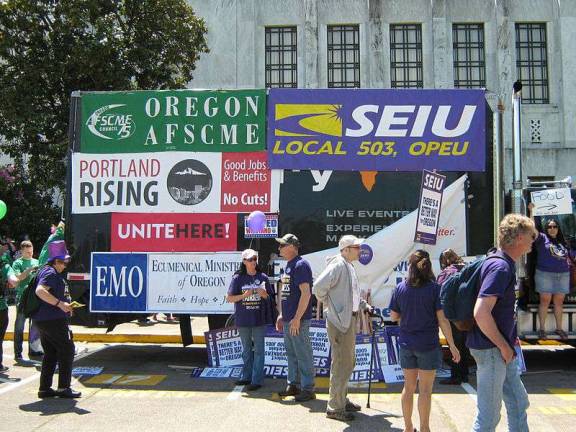When We Talk About Labor: Sam Parker Looks at the Puzzling Why America Looks at Unions

Members of two prominent labor unions found themselves without contracts this month, the agreements with their respective employers expired and negotiations for new ones stalemated over arguments over the concessions the workers would have to make. One group, the Chicago Public Schools teachers' union, was on strike in an attempt to mitigate the impact standardized testing would have the city's students' future; the NFL's referees were locked out by the league, which may have led to a blown call by replacement officials that cost the Green Bay Packers a win on Monday Night Football. Guess which situation has politicians and citizens alike up in arms and demanding justice? It's vexing, how Americans look at labor issues: we ostensibly believe in "fairness," and just pay for hard work, but the moment those abstract concepts gain just a little context, people seem to instantly label unionized workers as selfish and lazy. Never mind that what they're striking against is precisely what everyone complains about at the end of a long day at the office: the meddling, stodgy boss; the stingy, heartless corporation; the economy that stacks the odds against success ever higher. Somehow, thanks to a few bad apples and decades of mob movies, unions have become perceived as shady, scheming and part of the powers-that-be, instead of as a necessary counterbalance to the ever-more-powerful economic masters of the universe. It's a neat trick that Republicans have perfected: strengthen the job-exporting, wage-depressing corporations, while at the same time heralding them as aspirational success stories and "job creators," and then railing against the unions that try to protect the rights of the non-CEO class (or, as Mitt Romney calls them, the 47%). Speaking of Romney, his and other Republicans' reactions to the NFL's referee lockout has been nothing short of astounding (well, until you consider that they're politicians). While he has trashed labor unions in general, and tailored his hatred of workers to slam Chicago's striking teachers, he declared his outrage over the NFL's refusal to reach a fair agreement with the officials. Ditto for Paul Ryan and his fellow Wisconsin Republican, Governor Scott Walker, who tweeted his dismay over the Packers loss just about a year after he gutted public workers of most of their hard-earned benefits. It's beyond cynical, though that should come as no surprise. It's hard to imagine that those politicians truly care about the salaries of referees -- they're not owners and don't make millions -- but riding the rage wave was good for a few political points. The referee imbroglio has made headlines the last few weeks because, as the country's most popular sport, football is a shared interest, an event in which so many have a stake (even if it's just a rooting interest). On the other hand, it may seem like local labor disputes are just that: limited to a factory, a town, a company. But the impact of labor battles reverberate across the country; when one group holds out and wins, another gathers the courage to picket or stand firm, fighting for better wages and benefits and working conditions. We all may have the end of our Monday nights ruined by a blown call, but having our wallets lightened by non-stop fiscal cutbacks and benefit rollbacks is, ultimately, a lot more harmful. If only we had instant replay for that. Now, with the news that the referees and the league have reached a deal that will put the pro officials back on the field by Thursday night, we get a clear vision of just how much sway public support and vocal politicians can have on what are, ostensibly, private business affairs. And it is as alluring as it is depressing. Imagine if politicians spoke out in favor of teachers, nurses and factory workers; if parents and consumers backed the teachers and workers that teach their children, keep them healthy and make sure their cars are safe. Our economy would be a much more even playing field, that's for sure. But hey, at least we've got fair calls on touchdowns.